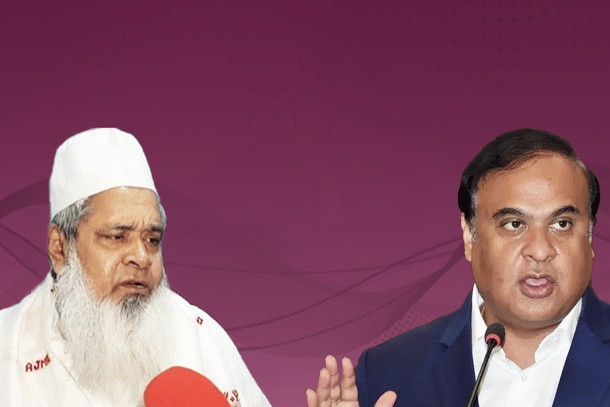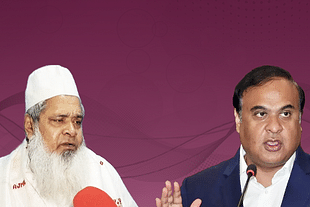Politics
Three Measures To Prevent Illegal Bangladeshi Immigrants From Capturing Political Power In Assam
Jaideep Mazumdar
Jan 14, 2023, 12:32 PM | Updated 12:32 PM IST
Save & read from anywhere!
Bookmark stories for easy access on any device or the Swarajya app.


Assam Chief Minister Himanta Biswa Sarma was absolutely right when he said earlier this month that population should not be the sole criterion in delimitation of Lok Sabha and Assembly constituencies in the state.
Sarma had explained that while the population of the state’s indigenous people was stagnant and even declining among some communities, the number of the Bangladesh-origin Bengali-speaking Muslims has been rising exponentially.
The delimitation exercise of 126 Assembly and 14 Lok Sabha constituencies in Assam was initiated by the Election Commission (EC) in late December last. The EC has, however, clarified that there will not be any increase in the number of Lok Sabha or Assembly constituencies in the state.
Usually, a delimitation exercise results in the increase in number of constituencies or redrawing the boundaries of some constituencies.
Chief Minister Sarma’s contention was that the sharp increase in the population of Bengali-speaking Muslims in Assam would translate into an increase in the number of seats where this community of illegal migrants are in a majority or present in significantly large numbers to influence poll outcomes.
“The state’s indigenous people are following population control norms while the Bengali Muslim community is not. The indigenous Assamese cannot be punished politically for following the law and the other community rewarded for breaking the law,” he told Swarajya.
An increase in the number of Assembly seats due to the increase in population of Bengal-speaking Muslims would give that community a lopsided political advantage and power in the state.
Even though the EC has categorically stated that the number of constituencies (Assembly and Lok Sabha) in Assam would not be increased due to the ongoing delimitation exercise, there is no guarantee that this embargo will continue in future.
The only way, then, to protect the political interests of the state’s indigenous people is to redraw the boundaries of the existing constituencies very imaginatively to deny political advantages that will accrue to the Bengali-speaking Muslims in areas where they are in a majority.
That, say political experts, can be done by parcelling off parts of areas dominated by Bengali-speaking Muslims and adding them to constituencies where the indigenous people are in a majority.
That way, the political advantage held by Bengali-speaking Muslims who tend to vote en bloc in favour of one candidate or party as dictated by their religious leaders can be neutralised.
According to estimates, Bengali-speaking Muslims (colloquially referred to as miyas in Assam) are in a majority, or present in significantly large numbers, in as many as 50 of the state’s 126 Assembly seats.
“This means that they can easily form a government in the state with someone from their own community as the chief minister. That has not happened till now because of deft political manoeuvrings and division of the miya votes. But we can’t count on such tactics forever and urgent measures need to be taken,” a senior BJP leader who did not want to be named told Swarajya.
Apart from redrawing constituencies, the present BJP-led government in the state also wants constitutional safeguards for the state’s indigenous communities.
One way of doing that is to reserve a majority of Assembly seats for the state’s indigenous communities and for scheduled castes and tribes.
“This measure needs to be taken immediately. This will be one major way to ensure that political power in Assam continues to stay in the hands of the Assamese (meaning all indigenous communities of the state).
"I do not mind sacrificing my own constituency Jalukbari (which he has been representing since 2001) if it is reserved for SC or ST for the sake of the indigenous people of Assam,” Sarma told Swarajya.
Reserving a majority of the Assembly seats for SC, ST and indigenous communities will ensure that Bengali-speaking Muslims do not capture political power in the state based on their numbers.
A prime example of this is the Karimganj Lok Sabha constituency in Assam’s southern Barak Valley. The Lok Sabha seat covers Karimganj district where Muslims form nearly 58 per cent of the total population.
Karimganj Lok Sabha seat has eight Assembly segments of which five are Muslim-majority segments. Of the eight MLAs from Karimganj, five are Muslims.
But the Karimganj Lok Sabha seat is reserved for SCs and, thus, has a Hindu MP. Since 1962, Karimganj has been represented in the Lok Sabha by only Hindus; the present MP is BJP’s Kripanath Mallah.
“If more constituencies are reserved for SCs and STs, as well as the recognised indigenous communities of the state, then Bangladesh-origin Muslims can be prevented from capturing political power in Assam,” said the BJP leader.
Another major and crucial project that will prevent the Bangladesh-origin Bengali-speaking Muslims from capturing political power in Assam is a fresh exercise to update the National Register of Citizens (NRC).
The last NRC updation exercise held under the supervision of the Supreme Court (SC) and as per rules, norms and procedures framed by the earlier Congress government (under chief minister Tarun Gogoi) turned out to be a highly flawed exercise that favoured the illegal Muslim migrants from Bangladesh.
The earlier exercise was also rigged by the Congress and powerful lobbies favouring the illegal migrants.
All these three major measures can secure the future of Assam and its indigenous people -
the imaginative redrawing of boundaries of constituencies,
reserving most of the Assembly and Lok Sabha seats for SC, ST and indigenous communities,
and a fresh, transparent and rigorous NRC updation.
Or else, political power will go into the hands of the largely illiterate, regressive, exclusivist and rabid Islamist community of Bangladesh-origin Bengali-speaking Muslims. That will spell doom for the Assamese and for Assam’s culture, heritage and even existence.
Jaideep Mazumdar is an associate editor at Swarajya.




